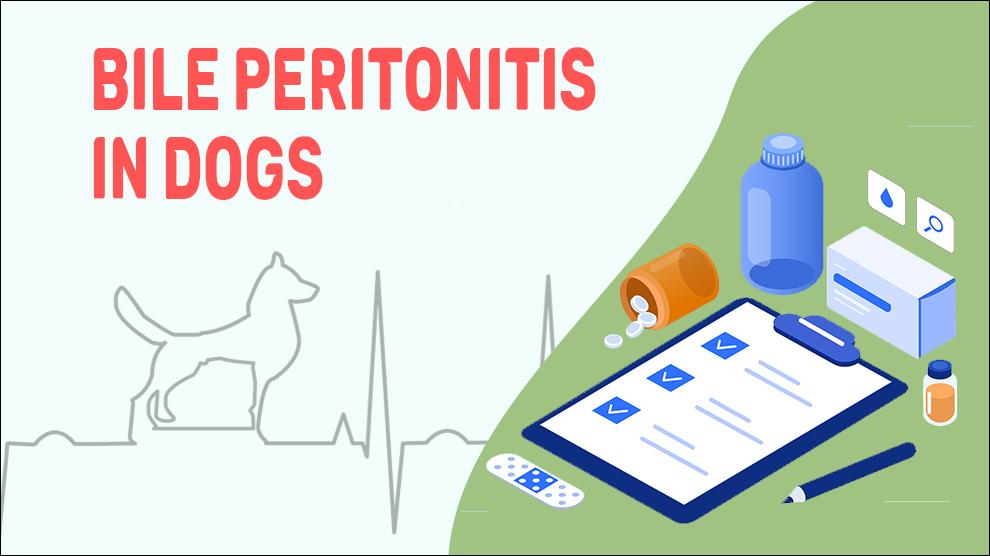What is Bile Peritonitis In Dogs?
Bile peritonitis is a severe intra-abdominal emergency – nonseptic, intense inflammatory response to bile in the abdominal cavity. This is caused by perforation of bile duct, cystic duct, hepatic ducts, upper gastrointestinal tract or the gallbladder.
Resulting as a secondary condition of underlying disease, Bile peritonitis is a serious disorder that pertains to injury affecting the lining of the abdominal cavity or the peritoneum. Bile peritonitis caused by an infection kills almost 75 percent of pets. Early intervention is necessary for recovery.
Signs can be chronic or acute. Though, non-infectious bile peritonitis symptoms are long-term while symptoms for infectious bile peritonitis are typically acute.
Symptoms Of Bile Peritonitis In Dogs?
Treatment Options For Bile Peritonitis In Dogs
In the vet's clinic, a complete blood profile, including a complete blood count, a chemical blood profile and a urinalysis will be performed.
Ultrasound and Abdominal x-rays in the liver and gallbladder area enable us to determine the origin and course of the bile leakage.
Your vet may take a sample of your abdominal fluid that is present in the abdominal cavity along with the dog's liver for biopsy.
Treatment will be based on the cause of the bile leakage from your dog's gallbladder into its abdomen.
Antibiotics, corticosteroids, and pain medication will be used to control infection and inflammation.
Hypoproteinemia (a low level of protein in the blood) is common in some dogs, so nutritional support may be provided with the feeding tube.
Other drugs and the need for surgery will be entirely at your vet's disposal after determining the cause of the leakage.
Home Remedies For Bile Peritonitis In Dogs
For the entire recommended time period, follow the instructions given by your veterinarian. No matter how badly you want relief for your dogs or what you hear from other dog owners, talk with your vet before trying any home remedy.
Despite appropriate treatments, recurrence is common when a predisposing factor is lurking unidentified.
How to Prevent Bile Peritonitis In Dogs?
Prevention from bile peritonitis can be done only by preventing underlying causes.
Precautionary use of antimicrobials (β-lactam (e.g., Cefaxolin) combined with a fluoroquinolone or aminoglycoside) has been used to control the risk peritonitis; though, if this is over used, it may spawn antibiotic resistant organisms in due course.
Pet owners should discuss how to prevent or decrease the possibility of bile peritonitis recurrence with their vet.
Affected Dog Breeds Of Bile Peritonitis
There is no breed disposition.
Additional Facts For Bile Peritonitis In Dogs
1. Bile peritonitis may result from the localized or generalized discharge of bile as a result of a complication of biliary tract inflammation, trauma, manipulation, obstruction, or due to spontaneous rupture of the biliary system.
2. Causes:
- Trauma (from injury, being hit by a car).
- Postoperative complications from a ruptured incision.
- Extrahepatic biliary tract obstruction (obstruction of bile flowing from the liver to the gastrointestinal tract).
- Gallbladder mucocele (overdistended gallbladder filled with an inappropriate accumulation of mucus).
- Necrotizing cholecystitis (severe forms of gallbladder inflammation).
- Neoplastic tumor growth (benign or malignant).
- Pancreatic disease.
- Gallbladder immotility, Gallstones.
- Liver lobe tear.
- Peritonitis.
- Cholangiohepatitis (inflammation of the bile, liver, gall bladder).
When To See A Vet For Bile Peritonitis In Dogs?
Appropriate diagnosis of this disease is always best left to your vet to make sure that it is not progressing into a serious form.
As in many cases, the bile peritonitis etiology are often serious in nature and it has to be treated early and efficiently.
Dog Food Suggestions For Bile Peritonitis
What foods should I avoid?
- Fatty meats - beef, beef, steak, or high-fat cuts of red meat.
- Avoid full-fat cheese, sauces or gravies made with cream or full-fat yogurt.
- Avoid white or other processed bread, cookies, and cakes.
There are still plenty of things you can provide your dogs.
High-fiber foods
- Whole grain bread, rice, and cereal.
- Green beans, peas.
- Psyllium husk.
- Beet Pulp.
- Flaxseed.
Lean meats or meat alternatives
- Chicken breast.
- Ground meat (beef, pork, chicken, turkey).
- Salmon, trout, herring.
- Whitefish like cod and halibut.
Nutrient-dense, vitamin-dense fruits and veggies
- Legumes, such as lentils, peas, or beans.
- Cauliflower, cabbage, broccoli.
- Spinach, kale.
- Tomatoes.
- Citrus, such as oranges and limes.
- Avocadoes, blueberries, blackberries, raspberries.
Conclusion
As bile peritonitis is not a sign and disease in itself, treatment will depend on the predisposing cause.
Regular follow-up appointments to your veterinarian are essential as recovery would be slow. Always follow the progress and adjustment of the drugs or treatment techniques as necessary.

















